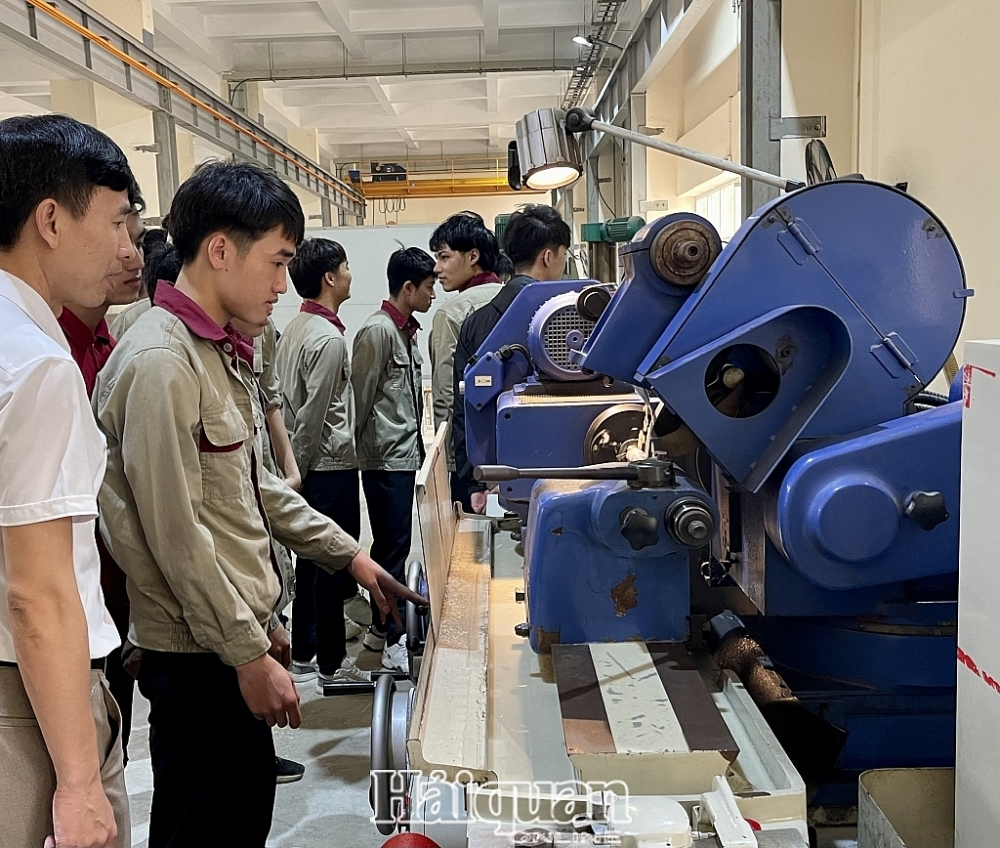Seek high-quality human resources by "ordering" training facilities
According to some international organizations, Vietnam lacks skilled human resources, and high-level technical workers for the supporting industry.
 |
|
The cooperation between enterprises and training institutions should be promoted to create qualified and suitable human resources. Photo: H.Diu |
Only 30-40% of workers immediately respond to technical requirements
Currently, human resources for industrial production enterprises have to meet increasing requirements according to international and integration standards, especially in high-tech industries such as electricity-electronics, mechanics, and information technology. Moreover, according to businesses, to produce products capable of joining the global supply chain and being exported, labor resources need to have technical standards on occupational skills according to international standards, focusing on training methods and international certification systems.
Speaking about the current business situation, Doan Huu Ly, Deputy General Director of MBT Electrical Equipment JSC, said that being a manufacturing enterprise in the field of electrical equipment and transformers with high requirements for quality and international standards, the company not only needed modern infrastructure but always required highly qualified and skilled workers to produce and operate the system smoothly.
According to Ly, the labor quality of the enterprise is temporarily satisfied, but still needs a high-quality labor source to serve the production of products with higher technical content, and better quality, bringing more added value to the enterprise.
Regarding this issue, Nguyen Hong Phong, Director of An Mi Tools Co., Ltd., said that according to the evaluation during the annual recruitment process at the enterprise, only about 30-40% of workers met the requirements, then the enterprise took a lot of time to re-train from expertise to production skills.
He also said that as an enterprise specializing in manufacturing high-precision tools and mechanical details for modern and high-tech industries, the business was very short of technical staff in machining, cutting, and automation.
"Order" from training facilities
With the above problems, businesses all emphasized the need to solve difficulties in finding and training quality human resources, in which they are eager to cooperate with training institutions to obtain suitable human resources.
According to Nguyen Van, Standing Vice Chairman of Hanoi Supporting Industry Business Association (HANSIBA), the association as well as businesses are making efforts to cooperate with universities, colleges, and vocational schools to train students according to specific needs from supporting industry enterprises. This not only reduces the cost of new training and retraining of human resources for businesses but also helps students of vocational training schools have opportunities to access practical knowledge and increase the possibility of getting a job right after graduation.
However, according to experts, enterprises and training institutions need to come up with methodical human resource training plans and have a cooperation roadmap to support the development of supporting industries. Along with that, it is necessary to offer appropriate remuneration as well as investment cooperation in training facilities.
Discussing this issue, Excellent teacher, Dr. Pham Xuan Khanh, Rector of Hanoi High Technology College (HHT), said that since being put into operation, HHT had a policy of training high-quality human resources to meet the needs of industrial parks, industrial clusters, and businesses in Hanoi city, focusing on supporting industry enterprises, especially FDI units.
Therefore, the school enrolls from 1,500-2,000 students annually with occupations that the market and businesses are in demand. Accordingly, students study, practice, and research at the same time to make products that can be commercialized. Thanks to that, many businesses have recruited 70-80% of HHT students.
Moreover, about the cooperation between businesses and schools, the principal of HHT said that businesses would invest in facilities, and equipment, and bring good experts to join the school from the stage of program development, curriculum, training organization, and student assessment. Then, businesses will use this workforce to serve their production and business activities.
However, according to Khanh, there is a difficulty that is still lacking in guiding documents that allow businesses to invest in facilities in the school as well as the cooperation between the school and businesses. Therefore, policies on this issue need to change towards openness, facilitating enterprises to socialize in investment, and helping the school have more resources in terms of equipment and facilities for training.








